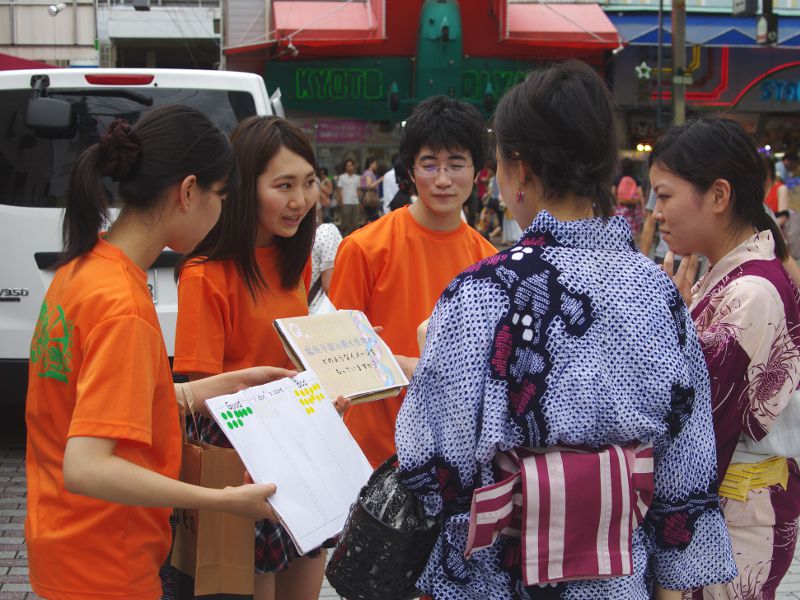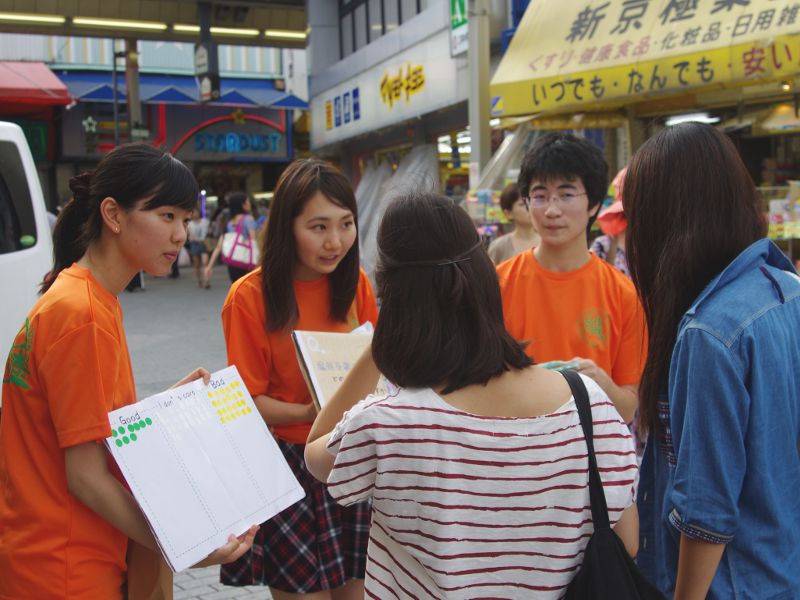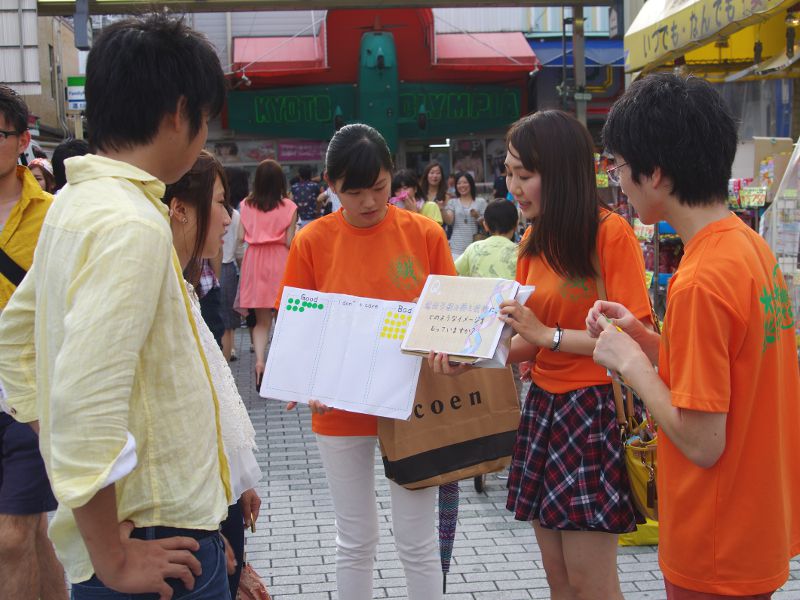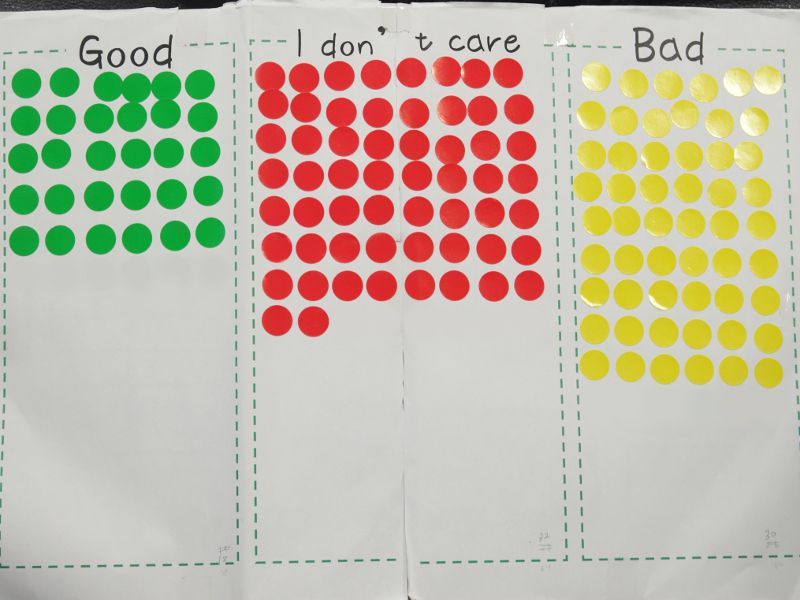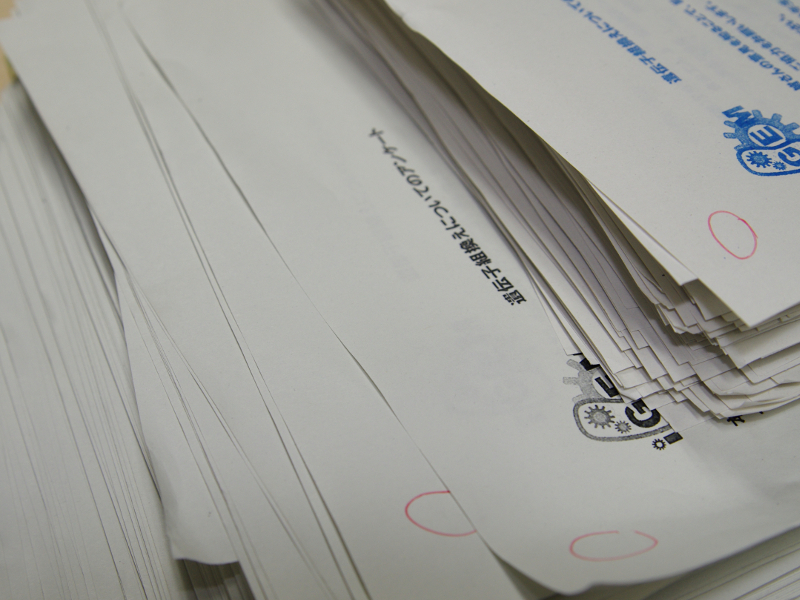Team:KIT-Kyoto/HumanPractice/survey
From 2014.igem.org
Lovetaylor (Talk | contribs) |
|||
| (16 intermediate revisions not shown) | |||
| Line 43: | Line 43: | ||
<h2>Survey on the Streets</h2> | <h2>Survey on the Streets</h2> | ||
<p class="sentence"> | <p class="sentence"> | ||
| - | + | August 15, 2014 | |
| - | August 15, 2014< | + | </p> |
| - | + | <p class="sentence"> | |
Our team members held a survey on people's awareness about genetic engineering on the streets in Kyoto. We asked the same questions as we had asked to high school students at the campus visit to see the broader trend. We also explained how genetic engineering is close to our everyday life by showing a genetically engineered potato chips. | Our team members held a survey on people's awareness about genetic engineering on the streets in Kyoto. We asked the same questions as we had asked to high school students at the campus visit to see the broader trend. We also explained how genetic engineering is close to our everyday life by showing a genetically engineered potato chips. | ||
| - | The result suggested that the general public feel distant and rather negative about genetic engineering.</p> | + | The result suggested that <b>the general public feel distant and rather negative about genetic engineering</b>. |
| + | </p> | ||
<h3>Questions</h3> | <h3>Questions</h3> | ||
<ul class="procedure"> | <ul class="procedure"> | ||
| Line 82: | Line 83: | ||
<li><img src="/wiki/images/1/1c/Kit_Survey5_c.jpg"></li> | <li><img src="/wiki/images/1/1c/Kit_Survey5_c.jpg"></li> | ||
<li><img src="/wiki/images/7/76/Kit_Survey6_c.jpg"></li> | <li><img src="/wiki/images/7/76/Kit_Survey6_c.jpg"></li> | ||
| + | <li><img src="/wiki/images/a/a5/Kit_Survey8.jpg"></li> | ||
</ul> | </ul> | ||
<div id="stop" class="stop"><a href="javascript:void(0);"><span>stop</span></a></div> | <div id="stop" class="stop"><a href="javascript:void(0);"><span>stop</span></a></div> | ||
</div> | </div> | ||
| + | <br> | ||
<h2>Paper-based Survey</h2> | <h2>Paper-based Survey</h2> | ||
<p class="sentence"> | <p class="sentence"> | ||
<h3>Background</h3> | <h3>Background</h3> | ||
| - | < | + | <p class="sentence"> |
| - | + | We conducted a survey to know how the general public in Japan perceive synthetic biology and genetic engineering technology. The respondents were of broad ages from high school students to senior citizens. Our target was to ask <b>1,500</b> people. | |
| - | </ | + | </p> |
<br> | <br> | ||
<h3>Questions</h3> | <h3>Questions</h3> | ||
| Line 176: | Line 179: | ||
<img src="/wiki/images/e/ee/Kit_Survey_g5.png" width="350px"> | <img src="/wiki/images/e/ee/Kit_Survey_g5.png" width="350px"> | ||
<img src="/wiki/images/a/aa/Kit_Survey_g6.png" width="500px"> | <img src="/wiki/images/a/aa/Kit_Survey_g6.png" width="500px"> | ||
| + | <img src="/wiki/images/a/aa/Kit_Survey_g10.png"> | ||
<img src="/wiki/images/3/33/Kit_Survey_g7.png" width="350px"> | <img src="/wiki/images/3/33/Kit_Survey_g7.png" width="350px"> | ||
</div> | </div> | ||
| Line 181: | Line 185: | ||
<br> | <br> | ||
<h3>Discussion</h3> | <h3>Discussion</h3> | ||
| - | < | + | <p class="sentence"> |
| - | + | We got responses from <b>1571</b> people. More than half of the respondents had negative image about genetic engineering. When they hear the word genetic engineering, GM foods came to the mind for many. The technology of gene-recombination came across some decades ago. The word itself seemed to have become common today, but <b>almost nobody knows what it really is</b>. When asked what they think about gene-recombination, more than one third said that it is something unknown. It is significant for iGEM to appeal its safety, utility, and the environmental impact. | |
</ul> | </ul> | ||
<br> | <br> | ||
<h3>Conclusion</h3> | <h3>Conclusion</h3> | ||
| - | < | + | <p class="sentence"> |
| - | + | Gene-recombination is applied not only to food, but also to medicine, the environment and broader industries. This trend will never cease. Synthetic biology will evolve continuously, as the number of participating teams in iGEM is also increasing year by year. The research in this field has huge potential. Through Policy & Practices <b>we hope to play a role in improving people’s awareness about gene-recombination</b>. | |
| - | + | ||
<br> | <br> | ||
</p> | </p> | ||
| Line 264: | Line 267: | ||
.surveyimg{ | .surveyimg{ | ||
margin:10px 20px; | margin:10px 20px; | ||
| + | } | ||
| + | .note{ | ||
| + | line-height:2em; | ||
| + | } | ||
| + | @media screen and (max-width: 568px) { | ||
| + | .surveyimg{ | ||
| + | margin:10px 0px; | ||
| + | } | ||
} | } | ||
</style> | </style> | ||
Latest revision as of 01:53, 25 November 2014
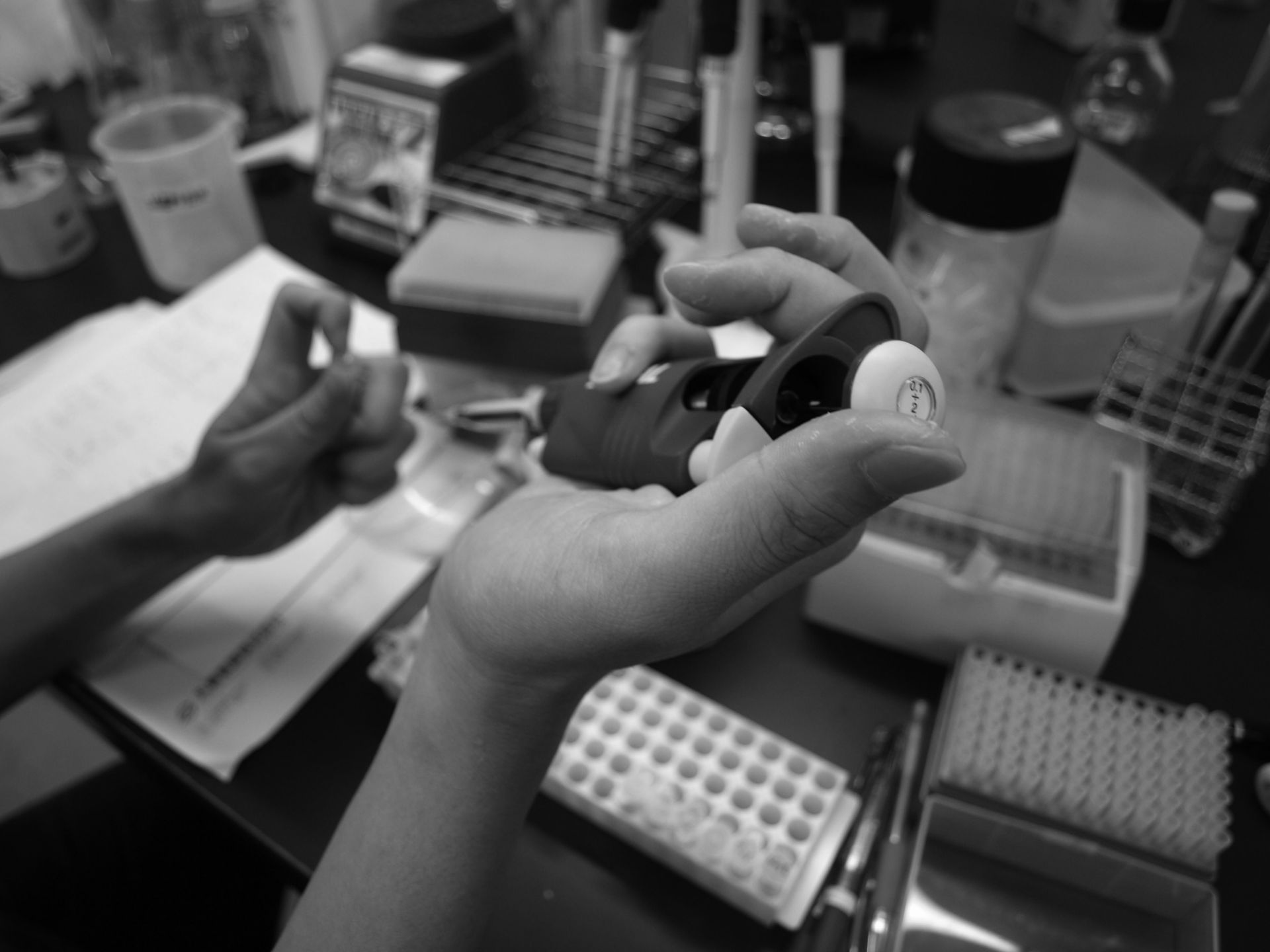


Policy & Practices
Survey on the Streets
August 15, 2014
Our team members held a survey on people's awareness about genetic engineering on the streets in Kyoto. We asked the same questions as we had asked to high school students at the campus visit to see the broader trend. We also explained how genetic engineering is close to our everyday life by showing a genetically engineered potato chips. The result suggested that the general public feel distant and rather negative about genetic engineering.
Questions
- What kind of image do you have on genetic engineering?
- Good
- Bad
- I don't care
- Do you feel familiar with genetic engineering?
- Yes
- No


Paper-based Survey
Background
We conducted a survey to know how the general public in Japan perceive synthetic biology and genetic engineering technology. The respondents were of broad ages from high school students to senior citizens. Our target was to ask 1,500 people.
Questions
What do you think about genetic engineering?- Positive
- Somewhat positive
- Somewhat negative
- Negative
- Not sure
If positive, why? Please select all that apply.
- GM foods are the results of scientific progress
- Able to increase the yield
- GM has already been commercialized
- Able to design crops to fit our needs
- Other
If negative, why? Please select all that apply.
- Too much unknown
- Not sure about
- Unsafe as food
- Dangerous according to media
- Other
When you go to a grocery store, which do you buy, GM foods or non-GM foods?
- Always non-GM foods
- Prefer non-GM foods
- Always GM foods
- Prefer GM foods
- No response
If the price of non-GM foods is 10-20% more expensive than GM foods, what would you do?
- Still buy non-GM foods
- Buy GM foods
- Other
When you hear genetic modification and biotechnology, what comes to your mind? Please select all that apply.
- Cloned animal
- GM foods
- Bioethics
- Artificial life
- Bioweapon
- iPS cells
- ES cells
- Biofuel
- Gene therapy
- Other
Which sentence describes your ideas about genetic modification? Please select all that apply.
- Mysterious
- Potential effects on the ecosystem
- No negative effects on future generations
- Potential effects on future generations
- Unethical
- Unproven safety
- Other
Do you think that the research on genetic modification should be continued in the future?
- Yes
- No
- Neither of the above
Results



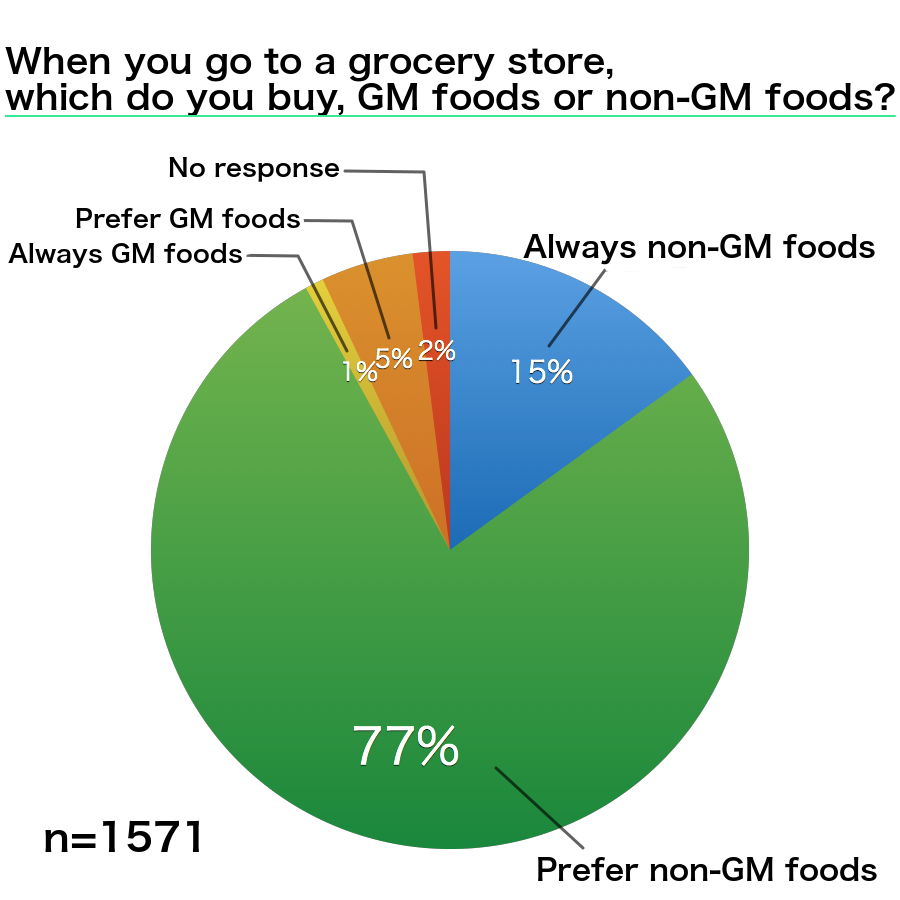




Discussion
We got responses from 1571 people. More than half of the respondents had negative image about genetic engineering. When they hear the word genetic engineering, GM foods came to the mind for many. The technology of gene-recombination came across some decades ago. The word itself seemed to have become common today, but almost nobody knows what it really is. When asked what they think about gene-recombination, more than one third said that it is something unknown. It is significant for iGEM to appeal its safety, utility, and the environmental impact.
Conclusion
Gene-recombination is applied not only to food, but also to medicine, the environment and broader industries. This trend will never cease. Synthetic biology will evolve continuously, as the number of participating teams in iGEM is also increasing year by year. The research in this field has huge potential. Through Policy & Practices we hope to play a role in improving people’s awareness about gene-recombination.
 "
"


